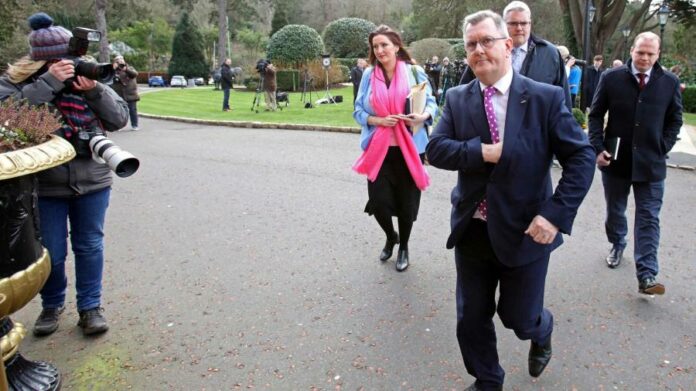Barely four months into the role, Rishi Sunak faces a defining moment of his premiership. He appears close to an agreement with Brussels that would resolve the dispute over post-Brexit trading rules with Northern Ireland. Ending the animosity in UK-EU relations could bring real economic and political benefits. But opposition from Conservative and unionist hardliners makes this politically perilous for him. If a deal is in reach that addresses the practical problems being faced by the Northern Irish people, Sunak should be ready to face down Brexit purists and the Democratic Unionist Party.
After Boris Johnson’s 2020 Brexit deal left Northern Ireland inside the EU single market for goods, checks were introduced on goods entering Northern Ireland from Great Britain, to avoid creating a land border with the south of the island. The result of the “Northern Ireland protocol” has been trade snarl-ups that unionists, those who wish the region to stay in the UK, feel have weakened ties with Britain.
The new outline deal would create a “green lane” at Irish Sea ports, with minimal checks on goods whose final destination is Northern Ireland. A “red lane” would handle goods destined for Ireland and the EU market. Brussels appears to have compromised on implementation of the rules, showing readiness to reduce frictions in GB-Northern Ireland trade. But it has not ceded ground on constitutional points, including ensuring the European Court of Justice has the final say on single market issues — though there may be language playing down the court’s role.
An agreement would have huge positives for Northern Ireland and the wider UK. Repairing trust with the EU could open the way to closer co-operation, from enabling the UK to join the Horizon scientific research programme, to deepening defence and energy links.
If the European Reform Group of Eurosceptic Tory MPs opposes Sunak’s deal, he should be ready to push through a vote with Labour support. All prime ministers are wary of relying on opposition votes but the political prize here is big enough to justify doing so. Nor should Sunak be swayed by pressure from Johnson not to ditch, as part of any new agreement, a bill that would allow ministers unilaterally to override the protocol.
Downing Street must be ready to be robust, too, with the pro-UK DUP. The party has boycotted the Northern Ireland assembly since elections last May, blocking the formation of an executive, unless the protocol is dropped. Northern Ireland sorely needs a mechanism for taking decisions on issues from healthcare to the cost of living crisis.
No one section of the community ought to be able to hold the rest hostage, be it nationalists who want the region to be part of Ireland, unionists, or the “neithers” in between. The DUP, though now the biggest unionist party, represents only a part of unionist opinion, and its extremist stance on the protocol was never deliverable. Many in the region see advantages in being inside both the UK and EU single markets, and would prefer to make the trading rules work. The DUP’s interests are better served by showing that Northern Ireland can continue to function well inside the UK.
If the unionist party maintains its stance, Westminster needs to ensure proper government can be provided — even if it comes direct from London. In that situation, removing the DUP’s veto on allowing the Northern Ireland assembly to sit so it could have input into those decisions would be a bare minimum. Dublin should also be consulted on decisions. This solution is clumsy. But Northern Ireland’s future, and the UK’s ties with the EU, cannot be kept in limbo by the demands of a party whose stance threatens to undermine the very cause it claims to represent.






